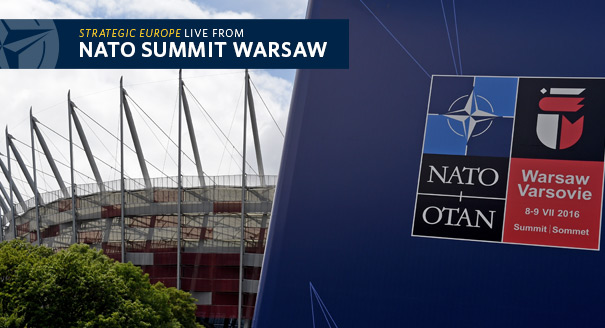Carnegie Europe was on the ground at the NATO summit in Warsaw, offering readers exclusive access to the high-level discussions as they unfolded. See our live coverage here.
When the Communist regime was ousted from power in 1989, one of the first strategic decisions the new independent Polish government made was to join the European Union and NATO. For the country’s new leaders, becoming a member of the postwar Euro-Atlantic architecture was about making Poland safe, secure, and free.
This determination to join NATO was not greeted with open arms by many alliance members, from Washington to Berlin. The argument was that admitting Poland and other former Communist countries into NATO would only antagonize Russia. It could lead to instability. And besides, was NATO really prepared to go to the defense of Poland, which would mean a war with Russia?
Poland persisted. In 1999, it joined NATO along with the Czech Republic and Hungary, to be followed in 2004 and 2009 by the Baltic states, the rest of Central Europe, Romania, and Bulgaria. For Poland, hosting the 2016 NATO summit in Warsaw shows that such determination has paid off.
But NATO is very different today from a decade ago, when it was searching for a role before becoming bogged down in Afghanistan. The conflicts along NATO’s Eastern and Southern flanks have challenged the security of Europe. They have also challenged the resilience of the West. These two issues will dominate the Warsaw summit.
Because of Russia’s 2014 annexation of Crimea and occupation of parts of eastern Ukraine, the war in Syria, the rise of the so-called Islamic State, and the migration crisis, NATO has had to rethink its entire strategy as a military and political organization.
Even though the Northern and Southern members of NATO still have different perceptions of the threats they face, the alliance as a whole—but particularly the Europeans—is at a fundamental crossroads over how it deals with the security of the European continent.
Angela Merkel knows this. In a speech to the German parliament on the eve of the Warsaw summit, the German chancellor put paid to the idea that her government was not committed to the defense of Germany’s NATO allies or was ambiguous toward NATO.
Merkel did this for several reasons. A recent Pew report showed that Germany would not be prepared to defend the Baltic states if they were attacked (presumably by Russia). “Alliance solidarity of Article 5 of the NATO treaty is the central pillar of its architecture. This solidarity must be credible,” Merkel said. She also supported NATO increasing its presence in Poland and the Baltic states, as well as in Romania and Bulgaria.
Her speech was reassuring for another reason. The German foreign minister, Frank-Walter Steinmeier, recently accused NATO of “saber rattling” because of its exercises in Poland and the Baltic states. If that was saber rattling, then how would he have described Russia’s de facto occupation of the Donbas region in eastern Ukraine?
Steinmeier and the German economy minister, Sigmar Gabriel, also suggested it was time to consider phasing out the sanctions on Russia that were imposed by the EU and the United States in early 2014 in response to Russia’s war in Ukraine. Merkel was having none of that. She made clear that Russia’s hybrid war had challenged the post–Cold War security architecture. NATO had to find ways to protect its members.
As for Ukraine and Georgia, which want to join NATO one day, Merkel said, “We are not closing the door.” In the meantime, she called for “deterrence and dialogue” with Russia. “They are not contradictions, they are indeed inseparable,” she added. No doubt Steinmeier would see it differently.
Merkel also went out of her way to thank the United States for “taking on the main burden” of NATO deployments. This was no mere nod of gratitude to Washington. It was about acknowledging how the European members of NATO had to do much more for alliance security and for the defense of Europe. Germany, Merkel added, was no laggard when it came to spending more on defense. More fundamentally, Merkel was spelling out Germany’s commitment to NATO.
That commitment is more important than ever for the United States. The EU is now consumed by Britain’s decision to leave the bloc. Brexit will have an impact on Britain’s role in NATO and its relationship with the United States because Britain too will be consumed by the negotiations required to leave the EU. In short, strengthening Europe’s—particularly Germany’s—role in NATO is becoming ever more important.











